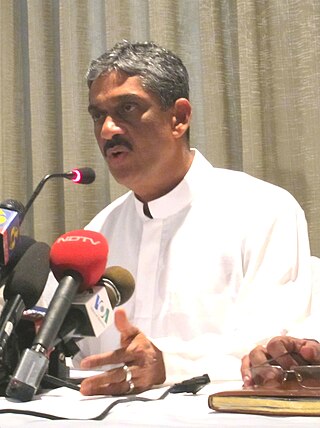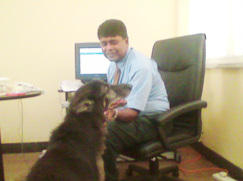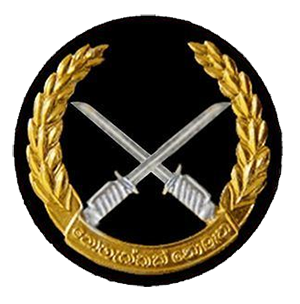Related Research Articles

The Liberation Tigers of Tamil Eelam was a Tamil militant organization that was based in the northern and eastern Sri Lanka. The LTTE fought to create an independent Tamil state called Tamil Eelam in the northeast of the island in response to violent persecution and discriminatory policies against Sri Lankan Tamils by the Sinhalese-dominated Sri Lankan Government.

The Sri Lankan Civil War was a civil war fought in Sri Lanka from 1983 to 2009. Beginning on 23 July 1983, it was an intermittent insurgency against the government by the Liberation Tigers of Tamil Eelam led by Velupillai Prabhakaran. The LTTE fought to create an independent Tamil state called Tamil Eelam in the north-east of the island, due to the continuous discrimination and violent persecution against Sri Lankan Tamils by the Sinhalese-dominated Sri Lanka government.

Lieutenant General Denzil Lakshman Kobbekaduwa, RWP, RSP, VSV, USP was a senior Sri Lankan Army officer who served in the 1971 Insurrection and the Sri Lankan Civil War.

Indian Peace Keeping Force (IPKF) was the Indian military contingent performing a peacekeeping operation in Sri Lanka between 1987 and 1990. It was formed under the mandate of the 1987 Indo-Sri Lankan Accord that aimed to end the Sri Lankan Civil War between Sri Lankan Tamil militant groups such as the Liberation Tigers of Tamil Eelam (LTTE) and the Sri Lankan military.
The Bandaranaike International Airport attack was a suicide raid Black Tigers of the Liberation Tigers of Tamil Eelam (LTTE) on 24 July 2001 on the Sri Lanka Air Force base SLAF Katunayake and the adjoining Bandaranaike International Airport in Katunayake, Sri Lanka. The attack was one of the boldest the LTTE mounted during its war with the Sri Lankan government, and had a profound impact on the country's military, economy, and airline industry.

The Sri Lanka Army is the oldest and largest of the Sri Lanka Armed Forces. The army was officially established as the Ceylon Army in 1949, though the army traces it's roots back in 1881 when Ceylon Light Infantry Volunteers was created; the army was renamed as the 'Sri Lanka Army' when Sri Lanka became a republic in 1972. In 2024, the Army had approximately 150,000 personnel.

Field Marshal Gardihewa Sarath Chandralal Fonseka,, commonly known as Sarath Fonseka, is a retired Sri Lankan army officer and politician. He was the eighteenth Commander of the Sri Lankan Army, and under his command the Sri Lankan Army ended the 26-year Sri Lankan Civil War in 2009, defeating the militant group, Liberation Tigers of Tamil Eelam; he thereafter briefly served as the Chief of Defence Staff. After retiring from the Army with the rank of General, he entered politics as the common opposition candidate in the 2010 presidential election contesting against President Mahinda Rajapaksa.

Rajiva Wijesinha, MA, DPhil is a Sri Lankan writer in English, distinguished for his political analysis as well as creative and critical work. An academic by profession for much of his working career, he was most recently Senior Professor of Languages at the University of Sabaragamuwa, Sri Lanka.

The Commando Regiment is the commando formation of the Sri Lanka Army. The unit specializes in various roles including hostage rescue, counter-terrorism, unconventional warfare, special reconnaissance, counter-insurgency, and personnel recovery. It was formed in 1980 and is based in Ganemulla, a suburb of Colombo.

Nandasena Gotabaya Rajapaksa, is a former Sri Lankan politician and military officer, who served as the eighth President of Sri Lanka from 18 November 2019 until his resignation on 14 July 2022 due to months of public anger. He previously served as Secretary to the Ministry of Defence and Urban Development from 2005 to 2015 under the administration of his elder brother former President Mahinda Rajapaksa, during the final phase of the Sri Lankan Civil War.
The Battle of Mullaitivu, also known as the First Battle of Mullaitivu and codenamed Operation Unceasing Waves-1, was a battle between the militant Liberation Tigers of Tamil Eelam and the Sri Lankan military during the Sri Lankan Civil War for control of the military base in Mullaitivu in north-eastern Sri Lanka.
Jayaprakash Sittampalam Tissainayagam is a Sri Lankan journalist. He was detained by the Terrorism Investigation Division of the Sri Lanka Police on 7 March 2008. He was held without charge for almost 6 months. He was indicted on politically motivated charges under the draconian Prevention of Terrorism Act for intending to incite communal hatred through writing, and furthering terrorist acts through the collection of money for his publication. On 31 August 2009, he was convicted of the charges by the Colombo High Court and sentenced to 20 years of rigorous imprisonment.

The Battle of Mullaitivu was a land battle fought between the Sri Lankan Military and the Liberation Tigers of Tamil Eelam (LTTE) for the control of the town of Mullaitivu in the Northern Theatre of Eelam War IV during the Sri Lankan civil war. The town of Mullaitivu was the last stronghold of the LTTE. The government declared on 25 January 2009 that its troops had entered the town and were consolidating their positions.

The Sri Lanka Armed Forces is the overall unified military of the Democratic Socialist Republic of Sri Lanka encompassing the Sri Lanka Army, the Sri Lanka Navy, and the Sri Lanka Air Force; they are governed by the Ministry of Defence (MoD). The three services have around 346,700 active personnel; conscription has never been imposed in Sri Lanka. As of 2021 it is the 14th largest military in the world, with 1.46% of the Sri Lankan population actively serving.
War crimes during the final stages of the Sri Lankan Civil War are war crimes and crimes against humanity which the Sri Lanka Armed Forces and the Liberation Tigers of Tamil Eelam have been accused of committing during the final months of the Sri Lankan Civil War in 2009. The war crimes include attacks on civilians and civilian buildings by both sides; executions of combatants and prisoners by both sides; enforced disappearances by the Sri Lankan military and paramilitary groups backed by them; sexual violence by the Sri Lankan military; the systematic denial of food, medicine, and clean water by the government to civilians trapped in the war zone; child recruitment, hostage taking, use of military equipment in the proximity of civilians and use of forced labor by the Tamil Tigers.
The Indian intervention in the Sri Lankan Civil War was the deployment of the Indian Peace Keeping Force in Sri Lanka intended to perform a peacekeeping role. The deployment followed the Indo-Sri Lankan Accord between India and Sri Lanka of 1987 which was intended to end the Sri Lankan Civil War between militant Sri Lankan Tamil nationalists, principally the Liberation Tigers of Tamil Eelam (LTTE), and the Sri Lankan Military.
Divisions of the Liberation Tigers of Tamil Eelam refers to the military, intelligence and overseas divisions the Liberation Tigers of Tamil Eelam (LTTE). Most of these divisions were destroyed during the Eelam War IV, and only parts of the intelligence and financing divisions remain overseas.

The 2013 Commonwealth Heads of Government Meeting was the 23rd Meeting of the Heads of Government of the Commonwealth of Nations. It was held in Colombo, Sri Lanka, from 15 to 17 November 2013. Commonwealth leaders agreed on Sri Lanka as the 2013 host for the meeting when they met in Port of Spain, Trinidad and Tobago, in 2009. Sri Lanka, which was originally slated to host the summit in 2011, was accused of committing atrocities during the Sri Lankan civil war and the summit was instead held in Perth, Australia; Colombo was given the 2013 summit instead. The leaders of Canada, Mauritius, and India boycotted the summit, citing alleged human rights violations by Sri Lanka against its Tamil minority. Protests were also banned during the summit. President Mahinda Rajapaksa summarised the summit's events as: "Issues covered in the communique include development, political values, global threats, challenges and Commonwealth cooperation." However, the meeting was overshadowed by controversy over Sri Lanka's human rights record and the alleged war crimes during the final stages of the civil war. This was the first time in 40 years that the Head of the Commonwealth, Queen Elizabeth II, was not present at the CHOGM.

Major general Prasanna Chandrasekera, is a retired Sri Lankan Army general. He was the former Master-General of the Ordnance of the Sri Lankan Army, During the Sri Lankan civil war he was the Brigade Commander, 65 Division of the Kilinochchi District.
References
- ↑ Blacker, David (19 May 2009). "Nineteen 'til I Die". The Blacklight Arrow.
- 1 2 Prematunge, Sajitha (1 June 2008). "Defying Dogma and Taboo". Sunday Observer. Archived from the original on 8 December 2010. Retrieved 18 January 2011.
- ↑ Blacker, David (August 2005). A Cause Untrue. Perera - Hussein Publishing House. ISBN 978-955-8897-06-5.
- ↑ Appuhamy, Joseph (11 March 2007). "Thriller that leaves you hungry for more". The Sunday Times . Archived from the original on 21 January 2011. Retrieved 17 January 2011.
- ↑ Wijedasa, Namini (9 November 2010). "The Enigmatic Relationship Between Anoma and Sarath Fonseka". www.transcurrents.com. Archived from the original on 15 October 2010. Retrieved 22 February 2011.
{{cite news}}: CS1 maint: unfit URL (link) - ↑ Blacker, David (12 April 2009). "How a Diaspora is Killing its Own". The Times of India . Archived from the original on 4 November 2012.
- ↑ Blacker, David (1 February 2009). "This war is a Writer's Block". The Times of India . Archived from the original on 4 November 2012.
- ↑ Blacker, David (13 July 2010). "Out in the Wilderness". Sunday Island.